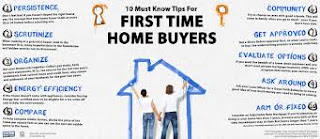Top 10 Tips for First Time Home Buyers - There's good news for renters! Recent dramatic changes in the mortgage finance industry have placed home ownership within easy reach of a greater number of New Englanders. A common obstacle today in purchasing a home is the outdated notion that obtaining a mortgage is an awesome task. Often, it is a lack of simple information, rather than a lack of money, that keeps people from even considering filling out a loan application. In fact, many can afford a new home for the same or slightly more than they are paying in rent now.
The following tips can help potential home buyers find the right start in locating a new home they can live in and a mortgage they can live with.
1. Pre-Qualify Before You Buy
Pre-qualification allows you to get an idea of your borrowing potential before beginning your home search. Pre-qualification is usually free and the buyer's ability to purchase a home can be confirmed quickly. This step increases the buyer's leverage position with Realtors and sellers.
2. Demonstrate You Can Pull Your Weight
A mortgage lender wants to know that your income can comfortably cover monthly mortgage payments and your assets are sufficient to cover the down payment and closing costs.
Acceptable sources of household income include earnings from your regular job and any secondary jobs, as well as overtime, commissions and bonuses. Also acceptable are interest and dividend income; social security, VA and retirement benefits; disability, welfare and unemployment benefits, alimony, child support and other entitilements.
A steady work history - continuous employment at the some company or line of business with consistent or rising income - helps the lender determine your ability to maintain the responsibility of a mortgage.
3. Make It Understood, Your Credit Is Good
Looking at your credit history is another way mortgage lenders determine your obligation to pay back a loan. Good credit history consists of a two-year history of prompt payments, a good record of on-time payments and no outstanding judgments or liens. Your mortgage consultant can help you address and correct any past credit problems in such a way that your chance of credit approval will be greater.
For example, if you have ever encountered some credit problems due to a lengthy illness, proper explanation for the problem can go a long way to rectify the negative perception created by a temporary set back.
4. The Program Is Key - Not The Rate You See
Don't be misled by a low ball rate; be sure to check out the details of the loan program. Most mortgages have either a fixed rate (payments remain the same for the life of the loan) or an adjustable rate (payments adjust up or down in accordance with national interest rates) and a term (amount of time you have to repay the loan) of either 15 or 30 years.
Down payment requirements differ from program to program. There are many first-time buyer programs that require as little as 3% down, as opposed to conventional programs that require up to 20% of the new home's sales price. Easier qualifying guidelines and reduced closing cost options are features of many of the programs available.
5. Pick A Real Estate Pro, Someone In-The-Know
Find a well-established Realtor who is familiar with the areas of your choice. Ask real estate professionals if they will be representing you as a sub-agent or as a buyer-broker agent. Selecting a qualified agent, who is able to answer your questions regarding the area, population, school districts, taxes, etc., will be a big time-saver, since he or she will save you a trip to the local records department.
6. Know What You Need And What You'll Concede
What is essential to one home buyer may be of no value to another. Creating "need-to-have" and "nice-to-have" lists can be helpful. Your first "need-to-have" list may be very different from your final version; still, it serves as a starting point for you to discuss and decide upon those features that are the absolute essentials.
For instance, public transportation to shopping areas might be a "need-to-have" if you do not own a car, while it is another person's "nice-to-have." If someone in your family is disabled, a one-level home with wheel chair access may be a necessary feature.
However, you may decide that adding a customized ramp after the home purchase is more cost effective. Identifying what you want and what you need helps your real estate agent pinpoint your ideal home.
by C. J. Speno


Posting Komentar